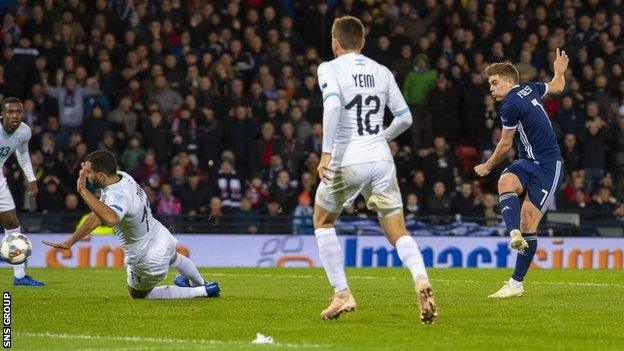Nations League: Why the competition still matters for Scotland
- Published

Scotland beat Israel to top their Nations League group last time out and earn a play-off play for Euro 2020
Scotland are two games away from the European Championships thanks to the inaugural Nations League.
The new campaign provides a similar - if reduced - opportunity to reach the 2022 World Cup in Qatar, which makes it important for Scotland to hit the ground running against Israel on Friday.
BBC Scotland explains what rewards the tournament could bring, and how it works. Strap yourself in and get your thinking cap on.
What's at stake?
Quite simply, a potential back door into the 2022 World Cup. You can't say fairer than that, can you? The suits at Uefa have been good to us again, as three of the continent's 13 entrants to the World Cup will come via the play-offs.
Basically, during the normal qualification process (which starts in March 2021) there will be 10 groups, with the winners qualifying automatically for the finals.
The 10 runners-up will then be joined by the two best Nations League group winners that failed to finish in the top two of their qualifying group.
Those 12 teams will be drawn into three different play-off paths. There will then be two semi-finals and a final in each path, with the three winners making the World Cup. Got all that?
Basically it means if Scotland do what they normally do and finish third or fourth in their qualifying group, but manage to top their Nations League section, then there is a chance they could sneak into the play-offs, given most of the teams above them will be likely to secure their place in the traditional way. Nice.

How does the Nations League work?
Scotland were promoted to League B after winning their section in the first ever Nations League, and are now in a group with the Czech Republic, Slovakia, and our familiar friends Israel.
Teams will play each other home and away, over the course of September, October and November, with the group winner gaining promotion to the top tier, League A, for the next competition. The bottom side will be relegated to League C.
Plenty of Scotland action to get our teeth into in the next few months, then, and the chance to get back among the big boys. That's a good thing, right?
What's changed?
If you've noticed already that the format of the tournament has changed, then you're doing really well.
Uefa increased the size of the top three tiers to 16 countries - meaning each group will have four teams instead of some just having three - and decreased the size of the bottom tier to seven.
That reshuffle meant none of the 12 teams relegated in the inaugural tournament - including Germany, Northern Ireland and the Republic of Ireland - had to drop divisions.
The 2018-19 Nations League had four guaranteed Euro 2020 places - with the 16 highest finishing teams not to qualify for Euro 2020 playing in four different play-off pools. As explained, that has been reduced for the World Cup.
Does any of that make sense?